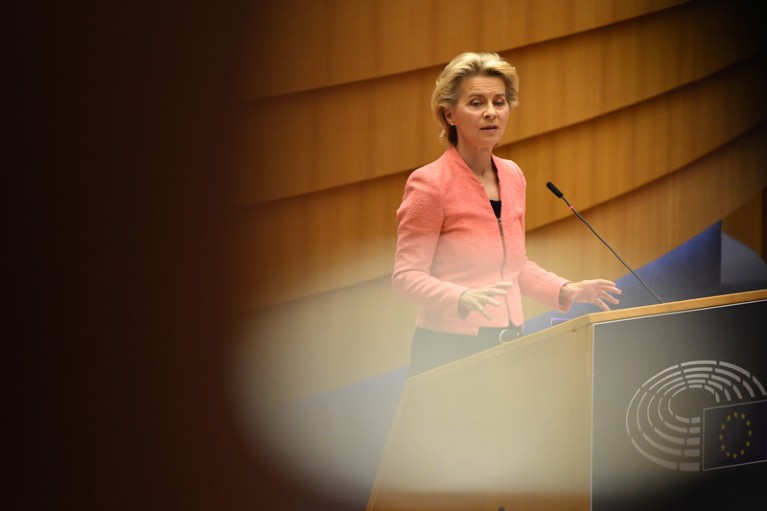
European Commission president Ursula von der Leyen revealed plans to strengthen health cooperation in her State of the Union speech in September.Credit: Geert Vanden Wijngaert/Bloomberg/Getty
How is it that countries with some of the world’s highest levels of health-care spending have also seen some of the highest mortality from COVID-19? This is one of the great mysteries of the coronavirus pandemic.
Almost one year into the crisis, five of Europe’s biggest economies — Germany, France, the United Kingdom, Italy and Spain — have recorded a total of almost 200,000 deaths. At the same time, the 27-country European Union has failed to produce much in the way of a unified response.
In the pandemic’s early months, some EU nations stopped exports of personal protective equipment, even to fellow member states. EU nations have so far allocated nearly €6 billion (US$7.1 billion) to support the pandemic response, but individual countries do not have a common benchmark on which to base interventions, so have differed on crucial issues such as what is meant by social distancing, when to lock down, and the rules of quarantine. The incoherence of the EU’s pandemic response is surprising for a group of nations that has so successfully acted and spoken with one voice on other cross-border issues, most notably climate change.
Fortunately, the European Commission and its ethics and research advisers have been working to get a firmer grip on the situation. On 11 November, the commission published a lengthy list of actions for the European Parliament and the governments of EU nations to consider. These include upgrading the European Centre for Disease Prevention and Control to improve its disease surveillance and its capacity to help countries to prepare for — and respond to — epidemics.
The plan, which is being steered by commission president Ursula von der Leyen, also calls for the establishment of a Europe-wide network of reference laboratories for testing human pathogens. Another proposed body is the EU Health Emergency Preparedness and Response Authority. One of its functions would include channelling public funding to companies and universities developing promising drug and vaccine candidates — similarly to the US Biomedical Advanced Research and Development Authority.
Independent research advice is at the heart of the proposals. Also on 11 November, the commission’s science and ethics advisers published a separate report, ‘Improving pandemic preparedness and management’. This reviews key literature on subjects including the biology, spread and economic effects of infectious diseases; the populations that are most vulnerable; and the rise of virus misinformation and conspiracy theories. The report draws on literature from many disciplines, and needs to be communicated widely, because it will help to provide a unified evidence base for those tasked with harmonizing member states’ pandemic response plans.
But last week’s announcement also highlighted a crucial gap in the EU plan, one that will require some creative thinking to bridge.
EU member states have not previously faced a challenge that needed a coordinated public-health response on the scale required by the current crisis. At the same time, health is not a part of the EU’s core ‘competences’ — those areas of public policy for which processes exist for member states to make collective decisions. Health is a matter for individual member countries, which is partly why the EU lacks a high-level group of decision-makers that can quickly be mobilized when an emergency strikes.
The commission recommends strengthening the EU’s existing health-coordinating body, the Health Security Committee. But there’s an argument for creating a higher-level network that could be activated in the event of a health emergency. Finance ministers are an example of such a group. They meet regularly, and acted in concert when the 2008 financial crisis threatened to devastate the world economy.
A recommendation to create an apex health network must come from Europe’s heads of government — it is beyond the remit of the commission, which is effectively the equivalent of the EU’s civil service. Discussions on its feasibility cannot begin soon enough.
The EU’s pandemic response also needs to be more open to the knowledge, experience and research of non-EU states, including those in Africa and Asia that have more experience of tackling dangerous infectious diseases and are, in some cases, managing the pandemic better.
This is a difficult time for international relations, as the EU reassesses its links with the United States, owing to four turbulent years under the presidency of Donald Trump, and with China. But EU decision-makers need to find a way to negotiate for the public-health needs of the union’s member countries alongside these changing political relationships. And they must heed the advice of their science and ethics advisers, who note, in their report, that because pandemics are international, “preparing for them and responding to them requires cooperation across countries and continents, irrespective of geopolitical alliances”.
The EU’s leadership must approach its pandemic response as it did the 2008 financial crisis and the 2015 Paris climate agreement. In both of those instances, EU leaders could have restricted their policy response to the boundaries of member states, but they wisely reached out and created alliances with other countries, including many in the global south, leading to a more powerful and more inclusive global response.
The EU understood that climate change and financial contagion do not observe borders. Neither does a pandemic, and the EU must act accordingly.

 Coronavirus: three things all governments and their science advisers must do now
Coronavirus: three things all governments and their science advisers must do now
 Major EU research scheme gets €4 billion boost
Major EU research scheme gets €4 billion boost
 A pandemic is no time to cut the European Research Council’s funding
A pandemic is no time to cut the European Research Council’s funding





